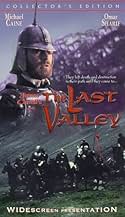Durante la Guerra dei Trent'anni del 1600, una banda di mercenari protestanti convive pacificamente con gli abitanti cattolici tedeschi in un'idilliaca valle di montagna nascosta e incontami... Leggi tuttoDurante la Guerra dei Trent'anni del 1600, una banda di mercenari protestanti convive pacificamente con gli abitanti cattolici tedeschi in un'idilliaca valle di montagna nascosta e incontaminata dalla guerra.Durante la Guerra dei Trent'anni del 1600, una banda di mercenari protestanti convive pacificamente con gli abitanti cattolici tedeschi in un'idilliaca valle di montagna nascosta e incontaminata dalla guerra.
- Inge
- (as Madeline Hinde)
Trama
Lo sapevi?
- QuizPerhaps the most praised element of the production was the score by John Barry, then most famous for his "James Bond" scores. In the new millennium, it was still regarded as one of his best scores. In a project to prepare a special CD release of the soundtrack, it was discovered that the complete original session recordings were either lost or destroyed.
- BlooperDuring the attack in the forest above the valley, a man with an arm injury is being comforted by a fellow soldier. The wounded man is lying against a rock but when an enemy shoots at him in the next frame he is standing as is his friend who was also leaning against the rock in the previous frame.
- Citazioni
The Captain: There is no Hell. Don't you understand? Because there is no God. There never was. Don't you understand? There is no God! It's a legend!
- ConnessioniFeatured in The World According to Smith & Jones: The Tudors (1987)
Take the time out to see it & see what you think. Cheers Jon ;0)
I più visti
- How long is The Last Valley?Powered by Alexa
Dettagli
Botteghino
- Budget
- 11.000.000 USD (previsto)
- Tempo di esecuzione2 ore 5 minuti
- Colore
- Proporzioni
- 2.20 : 1
Contribuisci a questa pagina






































